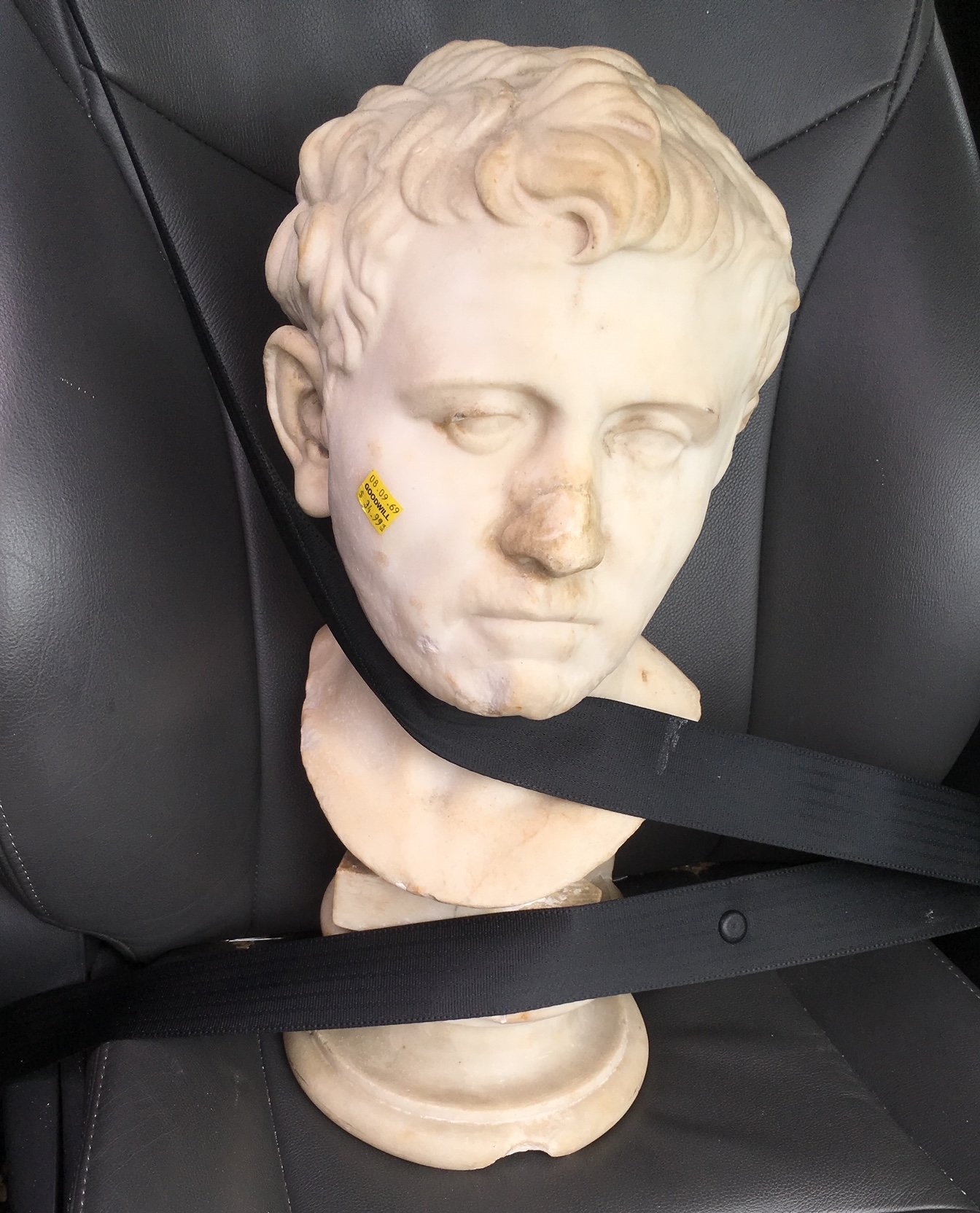
Everyone enjoys a good thrift shop find but few are lucky enough to encounter a windfall of art and other treasures worth exponentially more than their purchase price.
Laura Young, herself the owner of a thrift store, snagged what turned out to be an ancient Roman bust at a Goodwill in Austin, Texas, for just $35. The marble bust is believed to have been created between 100 B.C.E and 100 C.E. in Italy. Before its rediscovery, it was last seen at the Pompejanum—a full-scale replica of a Pompeii villa commissioned in the 1840s by King Ludwig I of Bavaria.
The area around the Pompejanum was heavily bombed during World War II and some believe the bust could have been taken by a U.S. soldier fighting in the area.
Though technically discovered more than five years ago, the treasure was on view at the San Antonio Museum of Art while the museum worked with Young and the Bavarian Administration of State-Owned Palaces to return the piece earlier this year. The value of the bust is not currently known.
Here, we have compiled a list of the top five thrift store flips in the art world in 2023.
ALBERTO GIACOMETTI CHANDELIER
Alberto Giacometti, Chandelier for Peter Watson. Photo courtesy of Christie’s Images Ltd. 2023.
Year Made: 1947-1949
Thrifted Price: $700 (in the 1960s)
Sold Price: £2.4 million ($2.9 million)
Percentage Flip: 414,185%
In the 1960s, British painter John Craxton recognized the chandelier displayed in the window of a shop as one commissioned by his late friend Peter Watson, an art collector. Craxton held on to it for decades until his death in 2009. It was sold at Christie’s auction in London earlier this year.
QING DYNASTY JARS
An associated pair of Chinese doucai ‘lotus and chrysanthemum’ jars. Photo courtesy Roseberys.
Year Made: ca. 1735-1796
Thrifted Price: $25
Sold Price: $74,318
Percentage Flip: 297,172%
These two jars were purchased by an unnamed seller from a thrift shop before they were sold by the London auction house Roseberys earlier this year. Further details about their discovery were not immediately known, other than that the finder has pledged to donate some of the proceeds from the sale back to the thrift shop, operated by a charity. The 4.5-inch-tall vases, created using the doucai technique, are decorated with blooming red and yellow chrysanthemum heads and lotus flower tendrils. They were fired in the imperial kilns of Jingdezhen, Jiangxi province and bear the mark of the Qianlong Emperor, the fifth of the Qing dynasty, who reigned from 1735 to 1796.
PABLO PICASSO CERAMIC PLATES
A hand-painted plate from Pablo Picasso’s “Visage Noir” series of ceramics, discovered at a Salvation Army by Nancy Cavaliere. Courtesy of Sotheby’s.
Year Made: 1940s
Thrifted Price: $8 total or $1.99 for each of four plates
Sold Price: $31,000 (Calculated off the sale of three plates. The fourth, bearing Picasso’s signature, has not been sold.)
Percentage Flip: 516,566% (Calculated off the sold price for three plates at $2 per plate.)
In 2017, Nancy Cavaliere bought four ceramic dishes from a Salvation Army in New York for a collective $8. She later discovered that they were made by Pablo Picasso and revealed her findings on TikTok. The plates belonged to Picasso’s ‘Visage Noir’ series of hand-painted ceramics, produced in a pottery studio in the southern French town of Madoura in the 1940s. Cavaliere sold three of the four plates to Sotheby’s for roughly $12,000, $13,000 and $16,000. The fourth piece has Picasso’s signature signed by his hand and was stored in a safe deposit box. Cavaliere plans to sell it in 20 years and give the money to her daughter. Though the sales were reportedly made 2018, Cavaliere did not reveal them until this year – earning her a spot on the 2023 list.
NAMIKAWA YASUYUKI CLOISONNÉ VASE
A tiny vase made by samurai Namikawa Yasuyuki will be sold at auction. Photo courtesy of Canterbury Auction Galleries
Year Made: 1868-1915
Thrifted Price: £2.50 ($3.20)
Sold Price: £6,300 ($7,664)
Percentage Flip: 239,400%
A woman named Karen and her partner Ahmet (the couple has opted to remain anonymous) spotted the rare Japanese artifact while shopping in a U.K. thrift store and contacted Canterbury Auction Galleries to authenticate the work. The tiny vase was made by 19th-century cloisonné artist (and one-time samurai) Namikawa Yasuyuki. It sold for just shy of the £7,000 it was expected to fetch at auction.
Henry Scott Tuke Painting
Henry Scott Tuke. Nude Study Of A Young Man (circa 1915). Photo courtesy of Batemans Auctioneers & Valuers
Year Made: circa 1915
Thrifted Price: $0
Sold Price: £24,800 ($31,036)
Percentage Flip: Cannot be calculated
This sale is included on this list because it created a unique situation where the percentage flip cannot be calculated because its starting point was from a $0 value. Basically, the painting was dropped off to a thrift store run by the Oxfam charity by an unknown donor likely unaware of its value. The painting was brought by a volunteer at the charity shop in to Batemans Auctioneers & Valuers in the U.K., where it sold for more than $31,000 after buyers premium. The majority of the proceeds were expected to go back to the charity shop.
More Trending Stories:
Art Dealers Christina and Emmanuel Di Donna on Their Special Holiday Rituals
Stefanie Heinze Paints Richly Ambiguous Worlds. Collectors Are Obsessed
Inspector Schachter Uncovers Allegations Regarding the Latest Art World Scandal—And It’s a Doozy
Archaeologists Call Foul on the Purported Discovery of a 27,000-Year-Old Pyramid
The Sprawling Legal Dispute Between Yves Bouvier and Dmitry Rybolovlev Is Finally Over